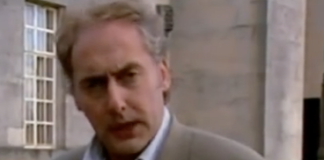- Opposites attract - 26th February 2026
- Upset coffee - 25th February 2026
- Not acting the part - 24th February 2026
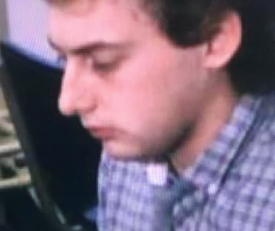
During 23 years with The BBC, and in a 41 year journalistic career (when he was trained to use clear and simple language, avoiding jargon), for our Editor, Welshman Phil Parry official apologies were a constant source of hilarity.
“Stop sniggering at the back there!”.
You could almost hear the News Editor saying this to stop the wave of general hilarity which swept the newsroom, as reporters read out (loudly) a correction or apology that had to be put out.
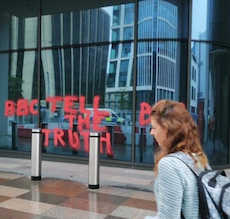 A Tweet (do we still call them that, or are they an ‘X’?!) attacking the Abolish The Assembly Party, was ‘liked’ by BBC Cymru Wales News, and they had to say that it was a “mistake” and an “error”.
A Tweet (do we still call them that, or are they an ‘X’?!) attacking the Abolish The Assembly Party, was ‘liked’ by BBC Cymru Wales News, and they had to say that it was a “mistake” and an “error”.
Bad for them – but everyone else might have thought it was quite funny, or that it wasn’t an ‘error’ at all.
One audience member said the reality was that it was “liked and then told it mustn’t be liked. Not liked in error”, and that the original ‘like’ was done “on purpose”.
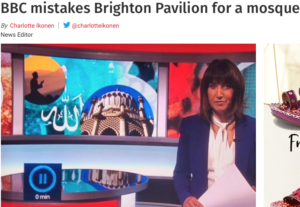 Perhaps there was an official apology after programme makers mixed up Brighton Pavilion with a Mosque when talking about Ramadan.
Perhaps there was an official apology after programme makers mixed up Brighton Pavilion with a Mosque when talking about Ramadan.
The error featured in the Brighton Argus, and one Twitter/X user complained: “BBC Wales showing a picture of the Brighton Pavilion and getting it confused for a mosque when talking about Ramadan is kind of f****d?”. Another wrote: “Not happy they’ve used a shot of Brighton Pavilion as though it’s a mosque (presumably)”.
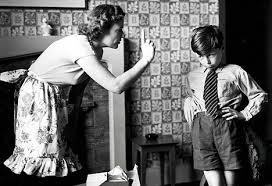
If there wasn’t one then there should have been, after all the former Director General (DG) Tony Hall has declared in an email to staff: “Every organisation should be able to acknowledge when it has made a mistake…”.
Some media outlets have an official corrections policy and pride themselves on putting things right, however small, and the po-faced nature of what they say can come over as inadvertently funny.

The Financial Times (FT) for example, said last month: “Danish group DSV was wrongly named as DVS in an article on October 18”.
You can just imagine that the journalists there might have been worried about the share price plummeting because people didn’t even know the company’s name!


One of the more unusual newspaper corrections also came in the FT.
In an article about Indian businessman Vijay Mallya, it claimed that Moraji Desai, the former Prime Minister of India, had a habit of drinking cow urine. The story was later amended to clarify that it was actually his OWN urine that he chose to drink. Although neither option sounds particularly palatable, the practice must have worked because Mr Desai lived to be 99 years old.

Vogue made a memorable blunder in a feature on Chelsea Clinton, when it described Dan Baer as an “interior designer”, but a subsequent ‘editor’s note’ clarified that he was in fact Deputy Assistant Secretary for the Bureau of Democracy, Human Rights, and Labor at the US Department of State.
This is, I would suggest, a long way from designing wall paper!

But it’s local UK newspapers which make the best mistakes.
There was, for instance, the “rabbit” who had been appointed to the area’s synagogue. and the robber who held up a shop while holding a “fireman”.
It’s not simply the articles themselves Editors need to be careful of – they are also ultimately responsible for what goes in the letters page.
The Sheffield Star, for example, fielded 110 complaints over a reader’s letter saying that Palestine campaigners were “brainwashed”, and they admitted that publishing the letter was a “grave error”.
 There have been lots of other ‘grave errors’ too.
There have been lots of other ‘grave errors’ too.
The Morning Sentinel in Illinois was forced into rather an embarrassing correction following a story about a local group, when it reported that Jon Henninger’s bandmate was “on drugs”. Its subsequent apology clarified that he had in fact been “on drums”.
When the New York Times (NYT) carried a review of Ann Pratchett’s book ‘This is the story of a Happy marriage’, a missing comma created the impression she was hitched to her pet dog. The error was corrected by the author herself – in a letter to the publication she said that while she did love her dog, she was in fact married to a man.

When the Arizona Republic Phoenix got itself in something of a muddle with its puzzle, its correction turned out to be an even bigger head scratcher!
Surely only the most ardent puzzle participants could really understand what this meant: “The Jumble puzzle, which appeared on D1 of Thursday’s edition, actually was the puzzle scheduled to appear today. The Jumble originally scheduled to appear Thursday as well as the answers to Wednesday’s puzzle are on page E1 today. The answers to the puzzle published today appeared Thursday, and the answers to the puzzle published Thursday will appear Saturday”.
The Guardian’s corrections and clarifications page included a classic correction in 2007, when the paper informed readers it had managed to spell the word ‘misspelled’ twice in a previous clarifications column, opting for the unconventional spelling ‘mispelled’.
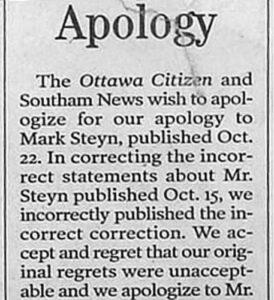 The corrections themselves can be a bit of a minefield.
The corrections themselves can be a bit of a minefield.
The Ottawa Citizen and Southam News found itself in the unusual and somewhat embarrassing predicament of having to apologise for its own apology.
The publication said that “in correcting the incorrect statements” it “incorrectly published the incorrect correction” and, somewhat unusually, went on to express regret that its “original regrets were unacceptable”.
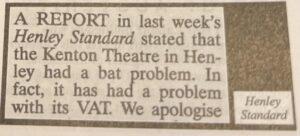 But perhaps this is all trumped (maybe the wrong word to use at the moment!) by one local paper in England getting ‘BAT’ confused with ‘VAT’ recently.
But perhaps this is all trumped (maybe the wrong word to use at the moment!) by one local paper in England getting ‘BAT’ confused with ‘VAT’ recently.
I’m sure to general hilarity from readers as well as the publication’s reporters, it proclaimed rather pompously: “A report in last week’s Henley Standard stated that the Kenton Theatre in Henley had a bat problem. In fact, it has had a problem with its VAT. We apologise”.
These mistakes themselves are a bit batty frankly (as the Henley Standard might say!).

The memories of Phil’s astonishing 41-year award-winning career in journalism (including some of the controversies he has uncovered when managers have had to say ‘sorry’) as he was gripped by the rare neurological disabling condition Hereditary Spastic Paraplegia (HSP), have been released in a major book ‘A GOOD STORY’. Order the book now!
Tomorrow – how for Phil identifying key trends was always crucial, and now new figures confirm a huge social change has been underway, with more people renting homes, and property prices soaring. Commentators believe that Wales could be a major beneficiary.









